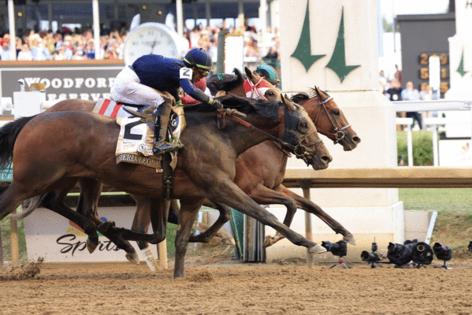Commentary: Why nobody cares about horse racing the other 364 days of the year
Published in Op Eds
The one day a year when America thinks about horse racing — Kentucky Derby day — is nearly here. But when the cocktail parties with the horseshoe-tipped swizzle sticks have fizzled out and the Run for the Roses is over, so is any talk about Thoroughbreds.
It would be easy to cite all the evils of horse racing, especially when the face of the sport is still the notorious Bob Baffert — who is now right back to the Kentucky Derby fresh off his 3-year suspension by Churchill Downs. The issues of drugs, fatal injuries, whipping, slaughter and corruption in this dying industry are all well documented. But there’s another key reason why the public has turned away from horse racing.
Consider this: If you ask a casual sports fan to name their favorite baseball player, this wouldn’t be a challenge. Ask the same question about a Thoroughbred, and most people would be stumped. They’d probably dig up “Secretariat” from 52 years ago or maybe “Seabiscuit” from back in the 1940s, if they saw the movie. Ask them about their current favorite racehorse, and there would be radio silence.
The contrast between horse racing and popular sports is even more stark in the arena of sports gambling and fantasy sports. The typical fantasy football player would be able to tell you statistical details about the backup running back and third wide receiver on every NFL team. Even beyond basic name recognition, fans of other major sports are emotionally invested in these players over their career trajectories, which is why Rory McIlroy’s recent win at the Masters was so compelling.
The horse racing industry has no easy marketing fix for the lack of name recognition, because it has created this anonymity almost by design. The select few successful horses on the track are quickly retired from racing and sold into breeding at an early age, as the breeding rights and stud fees are more lucrative than prize money. It’s a well-known axiom that the only way to make money in the racing industry is to “race to breed” rather than “breed to race.” Before the industry allows the public to get to know and watch a budding “celebrity,” the horse is sent to the breeding shed.
Ending their racing careers prematurely also ensures these fragile horses won’t have their lives (and profitable breeding careers) ended prematurely by a catastrophic injury on the track — no small worry given that more than three horses a day are killed in racing and training, which is like every player in Major League Baseball being killed every year.
But by retiring the only potential superstars when they still haven’t even reached physical maturity, the horse racing industry is shooting itself in the foot.
Horse racing has become more of a livestock genetics business than a sport. Triple Crown winner Justify raced just six times, all in a concentrated four-month blip in 2018 — and then was hustled off to become a stallion, who is bred to more than 250 mares every year. And I bet most people have never even heard of the 2022 Breeders’ Cup Classic winner, Flightline, who was arguably the Secretariat of his generation. He, too, raced just six times before being sent to stud duty.
This is one of the reasons why horse racing, which once had a monopoly on legal sports betting, is now the poor cousin in the sports gambling market and ironically needs subsidies from other forms of gambling — like slot machine revenue — just to survive.
Yes, the Kentucky Derby will be the gaudy, one-day anomaly, but for the other 364 days of the year, racetracks have more tumbleweeds than fans.
_____
Kathy Guillermo is a senior vice president at People for the Ethical Treatment of Animals (PETA), 501 Front St., Norfolk, VA 23510; www.PETA.org.
_____
©2025 Tribune Content Agency, LLC.




























































Comments